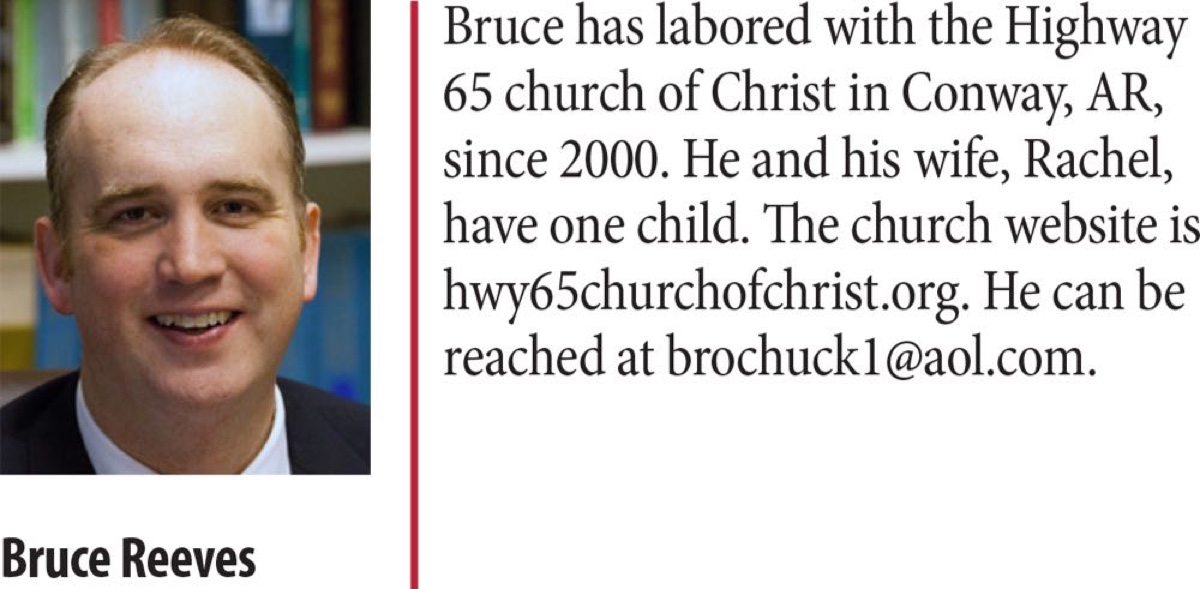By Bruce Reeves
Synopsis: Encouraging brethren to be part of the restored remnant, Bruce refutes some full-preterist and premillennial notions of Zechariah, and emphasizes the value of post-exilic work by the prophets.
God’s faithful remnant is seen in every turn of biblical history. The divine assurances given to His children reveal the preserving power and tender mercy of His steadfast love. The apostle Paul rightly observed that the Lord’s people are “afflicted in every way, but not crushed; perplexed, but not despairing; persecuted, but not forsaken; struck down, but not destroyed” (2 Cor. 4:8-9). In the fiery trials of tribulation, we are refined for God’s glory, renewed by His strength, and become “more than conquerors through Him that has loved us” (Rom. 8:37; 2 Cor. 4:16-18; 1 Pet. 1:6-9). It is amazing to consider the Lord’s providential faithfulness in His promises to Abraham, Israel’s deliverance from Egypt in the Exodus, and the proclamation of redemption by the prophets (Acts 3:21-26). Our Father has graciously called us out of a wicked world into the fellowship of His family (Rom. 1:4-5; 9:4-5; 11:11-18; Eph. 3:14-15; 1 John 5:19).
Old Testament history has two primary watershed events: the Exodus from Egypt and the Exile in Babylon. After the Exile, God brings a remnant of His people back to Jerusalem to rebuild the temple and experience a true revival of faith. This post-exilic period was filled with paradoxes. It was a time of powerful victories and crushing defeats, of noble leaders and polluted priests, of corruption and cleansing, and of decline and renewal. During this unique period of biblical history, we find powerful keys that can help us be God’s devoted followers and walk by faith in a chaotic world.
The exiles who returned home from Babylon in 538 BC began plans for rebuilding the temple, but adverse economic and political conditions delayed the project. Haggai and Zechariah passionately pleaded with the people to continue and complete the building. Let us focus our attention on the book of Zechariah as we consider The Remnant Restored.
The phrase “in that day” is a critical expression throughout the book of Zechariah. Both premillennialists and full preterists frequently misinterpret the meaning of the phrase. In so doing, they miss the major theme of the prophetic message. It is not speaking of the future second coming of Christ, nor the destruction of Jerusalem in AD 70. Rather, the heart of the message entails the importance of the rebuilding of the temple in preparation for the first coming of Christ. The phrase refers to Jesus’s birth, life, ministry, death, resurrection, ascension, and reign as King, as well as the life and persecution of the early church. It is critical that we recognize that the context is referring to spiritual Jerusalem, not physical Jerusalem (Luke 21:20-21; John 18:36; Gal. 4:26; 6:16; Heb. 12:22). Since Christians partake in spiritual Israel, we find great encouragement in the writings of the prophets as they point toward Christ and His people. We must not forget that Zechariah is a highly Messianic book!
The book of Zechariah dates itself in three passages. The first two fall in the “second year of Darius” (Zech. 1:1; 1:7) and the third in the “fourth year of king Darius” (Zech. 7:1). This reference is to the fourth Persian king, Darius Hystaspes, who reigned from 522 to 486 BC. It was during his reign that Jews who had returned from Babylonian exile were allowed to resume the rebuilding of the temple in Jerusalem (Ezra 4:24). Zechariah’s pivotal post-exilic message and work offers exhortation, warning, and promise. He warns Israel of God’s wrath, but then invites them to return to His fellowship (Zech. 1:2-3). The God whom we serve offers spiritual restoration: “I will return to Jerusalem with compassion; My house will be built in it. . . My cities will again overflow with prosperity, and the Lord will again comfort Zion and again choose Jerusalem” (Zech. 1:16-17). All those who would surrender to the Messianic Servant, described as the “Branch,” would worship God in unity (Zech. 3:8, 10; 8:22-23; 14:16-17). The “Branch” would serve as both King and Priest for all those who obey Him (Zech. 6:13; Heb. 5:8-9).
Spiritual Jerusalem refers to God’s faithful remnant. Zechariah declares the presence and mercy of the Lord toward His people: “Many nations will join themselves to the Lord in that day and will become My people. Then I will dwell in your midst, and you will know that the Lord of hosts has sent Me to you” (Zech. 2:11; cf. 3:9-10; 9:16). God is not speaking of literal land or a fleshly kingdom. He is describing those He has cleansed: “I will remove the iniquity of that land in one day” (Zech. 3:10). He goes on to proclaim the time when Christ’s light will shine in the world (Zech. 14:7; cf. John 8:12) and offer “living waters” of salvation (Zech. 14:8; cf. Matt. 8:11; John 4:10, 14; 7:37-38). Through Jesus Christ, we enjoy true restoration and salvation (Matt. 11:28-30; Acts 3:18-22; Gal. 6:1-2). Truly, what a blessing it is to live as God’s new creation and faithful remnant today (Rom. 6:3-4; 2 Cor. 5:17; 1 Pet. 2:9)!
No matter what tragic persecution may come upon the Lord’s remnant, they will be safe and secure in spiritual Jerusalem. Although we may suffer physically, the Lord will be with us. Zechariah assures us of God’s presence: “For I,” declares the Lord, “will be a wall of fire around her, and I will be the glory in her midst” (Zech. 2:5). The Lord’s work is performed by His power, not human wisdom: As the angel said to Zechariah, “This is the word of the Lord to Zerubbabel saying, ‘Not by might nor by power, but by My spirit,’ says the Lord of hosts” (Zech. 4:6; cf. Rom. 11:5).
Zechariah points us toward the salvation of the coming Messiah: “Rejoice greatly, O daughter of Zion! Shout in triumph, O daughter of Jerusalem! Behold, your king is coming to you; He is just and endowed with salvation, humble, and mounted on a colt, the foal of a donkey” (Zech. 9:9). Matthew directly applies this prophetic statement to Jesus’s triumphal entry into Jerusalem at the beginning of the final week before His death (Matt. 21:1-10). This depiction of spiritual Jerusalem occurred long before the second coming or even the destruction of Jerusalem in AD 70. We know this because Zechariah’s prophecy includes references prior to either event:
The purchase amount of Judas’s betrayal of Jesus for thirty pieces of silver (Zech. 11:12-13; cf. Matt. 27:9-10)
The betrayal of Christ (Zech. 13:7a; Mark 14:27)
The death of Christ (Zech. 12:10-14; cf. John 19:37)
The exaltation of Jesus as Lord (Zech. 11:9; cf. Matt. 28:18; Acts 2:36)
These facts show that the phrase, “in that day,” refers to a period of time, not a literal twenty-four-hour day. This time period references the incarnation, death, and reign of Christ, as well as the persecution of the early church.
Jerusalem is described as a “cup that causes reeling” and “a heavy stone” to the surrounding peoples who attempt to harm her (Zech. 14:2-3). The Lord promised “to destroy all the nations that come against Jerusalem” (Zech. 12:9). God’s people are admonished to live in Jerusalem where there will be no curse, but only security (Zech. 14:11). Such language clearly speaks of spiritual Jerusalem. If we can understand the difference between leaving a city and staying in a city, then we can understand that Zechariah is expressing the Lord’s protection of His spiritual city and people in times of persecution, not AD 70 or a millennial kingdom at the end of time.
Zechariah 14:2-3 is not describing a physical battle, but the spiritual conflict that the remnant will experience. Using warfare language, he says, “For I will gather all the nations against Jerusalem to battle, and the city will be captured, the houses plundered, the women ravished, and half of the city exiled, but the rest of the people will not be cut off from the city. Then the Lord will go forth and fight against those nations as when He fights on a day of battle.” Such militant language is a common metaphor for our spiritual conflict (2 Cor. 10:3-5; Eph. 6:10-17). While there will be casualties of war, as some fall away in times of suffering (1 John 2:19; Rev. 2:10), yet those who surrender to Jesus as King and Redeemer will be safe and secure. Brethren, let us dwell securely in spiritual Jerusalem!
Some seem deeply bothered by the idea of few rather than many being saved. Yet, Jesus taught that few would take the narrow path that leads to eternal life while many would take the broad way that leads to destruction (Matt. 7:13-14). The entire narrative of Scripture reveals that, although God lovingly invites all, the majority will not hear or heed heaven’s call. Rather, it is only (and always) a remnant that chooses to walk in obedience to His will. It is easy to be fashioned like the surrounding sinful world, rather than pursuing the sanctification of the Lord (2 Cor. 6:14-7:1).
Even while in captivity, some Jews became so acclimated to their surroundings that they had fallen into complacent indifference and were failing to see that it was time to return home and build for the Lord. Zechariah cries out, “Ho, Zion! Escape, you who are living with the daughter of Babylon” (Zech. 2:7). Have we become too comfortable in Babylon? Are we being “conformed to the world” rather than being “transformed by the renewing of our minds” (Rom. 12:1-2; 1 Pet. 1:13-16)? Are we being shaped by the perverse values of social media, corrupt cultural norms, and the permissiveness of a decadent society? Are we conforming to the expectations of the surrounding world in the way that we dress, speak, and behave? Have we become resistant and hostile to returning to the Lord’s work and sacrificing to build for His cause? Do we need to be restored? Let us seek our faithful Shepherd, compassionate Priest, and sovereign King (Zech. 6:13; 13:7)! Let us enjoy the tremendous blessings of walking with our God as His restored remnant!


